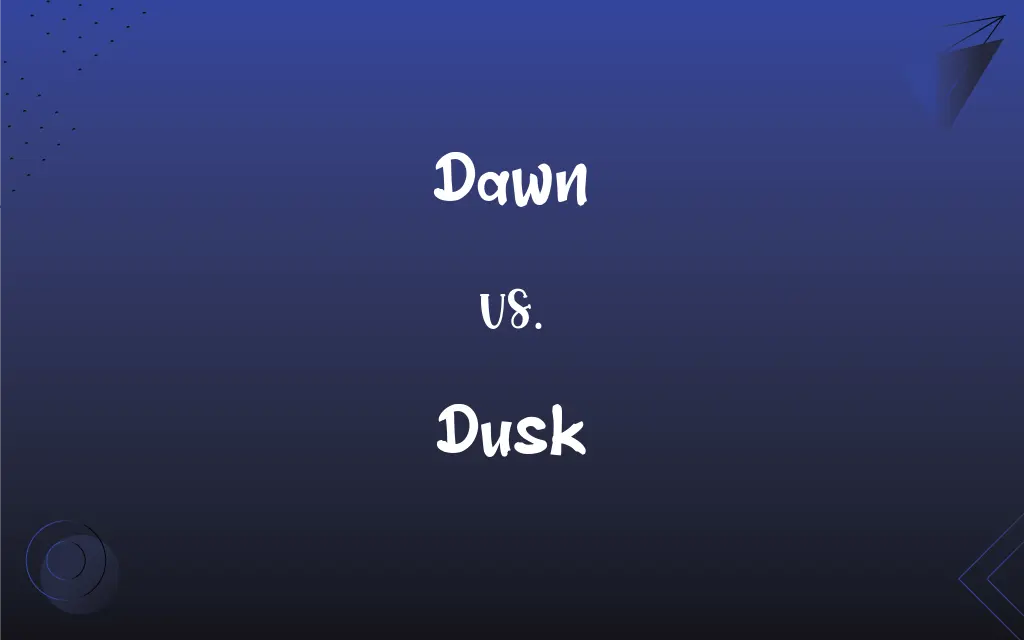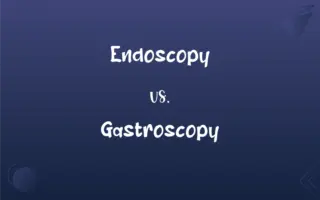Dawn vs. Dusk: What's the Difference?
Edited by Janet White || By Harlon Moss || Updated on May 31, 2024
Dawn is when the light first appears in the morning; dusk is when the light disappears in the evening.

Key Differences
Dawn heralds the advent of the day, a moment wherein the initial light permeates the darkness, signaling the onset of morning and presenting a metaphorical connotation of beginnings and awakening in various contexts. Contrarily, dusk signifies the day’s departure, where the residual light softly fades into the night, embodying a time of transitions and often symbolizing closure, endings, or transitions into nocturnal phases in both literal and symbolic contexts.
The atmospheric characteristics of dawn typically present a gentle, progressive illumination, often bathed in soft, warm hues, providing not only a visual spectacle but also symbolizing hope, renewal, and the inception of a new day or chapter.
Dusk, in its essence, casts a calm, often melancholy ambiance, as the remaining daylight, often drenched in rich, deep tones, steadily withdraws, symbolizing an end to the active participation of the day and a segue into the tranquil arms of the evening.
While dawn invariably casts its first light in the east, symbolizing new opportunities and beginnings, dusk gently ushers in the dark from the west, providing a symmetrical balance and cyclical rhythm to the earth’s diurnal pattern, and consequently, to life’s perpetual cycle of beginnings and endings.
Comparison Chart
Time of Day
Early morning, when light first appears
Early evening, when light disappears
ADVERTISEMENT
Symbolizes
Beginnings and renewal
Endings and closure
Direction
Light appears from the East
Light disappears in the West
Color Palette
Often warm, soft hues
Typically rich, deep tones
Associated Feel
Hope and awakening
Calmness and tranquility
Dawn and Dusk Definitions
Dawn
The first appearance of light in the morning.
Birds began to chirp before the first light of dawn.
ADVERTISEMENT
Dusk
A period marking the end of the day.
They planned to meet in the park just before dusk.
Dawn
A temporal point at which light begins to appear.
The fisherman set out at the crack of dawn.
Dusk
The fading of light and onset of darkness.
The streets began to light up as dusk fell.
Dawn
A metaphorical start or beginning.
The dawn of understanding appeared on his face.
Dusk
Symbolic representation of ending or closure.
His career was entering the dusk of its trajectory.
Dawn
The commencement of a phenomenon or period.
The project marked the dawn of a new era in technology.
Dusk
The time when daylight fades into night.
The sky was ablaze with colors at dusk.
Dawn
The initial phase of something.
We are at the dawn of a new political age.
Dusk
The diminishing light of the day.
The city skyline looked stunning against the gentle light of dusk.
Dawn
The time each morning at which daylight first begins.
Dusk
The darker stage of twilight, especially in the evening.
Dawn
A first appearance; a beginning
The dawn of history.
Dusk
Tending to darkness; dusky.
Dawn
To begin to become light in the morning.
Dusk
To become or make dark or dusky.
Dawn
To begin to appear or develop; emerge.
Dusk
A period of time at the end of day when the sun is below the horizon but before the full onset of night, especially the darker part of twilight.
FAQs
How does "civil dawn" differ?
Civil dawn occurs when the sun is 6 degrees below the horizon. It's light enough for most outdoor activities without artificial lighting.
Is dawn the same as sunrise?
No, dawn precedes sunrise. It's the period when light first starts to appear, leading up to the moment the sun becomes visible.
What does "dawn" mean?
Dawn refers to the first appearance of light in the sky before sunrise.
Is "dawn" a verb?
Yes, "to dawn" can mean to begin or to become evident to the mind, e.g., "It dawned on me that I forgot my keys."
What is the antonym of dawn?
Dusk is the antonym, signifying the evening's onset.
What are the phases of dawn?
Dawn can be divided into three phases: astronomical dawn, nautical dawn, and civil dawn.
What is "astronomical dawn"?
It's the time when the sun is 18 degrees below the horizon and the sky is still dark.
Can "dawn" be used as a name?
Yes, Dawn is a common first name in English-speaking countries.
How does dusk differ from sunset?
Sunset is the moment the sun disappears below the horizon, while dusk is the period following sunset when the sky is still partially lit.
What is "civil dusk"?
It's the time when the sun is 6 degrees below the horizon and there's enough light for most outdoor activities without artificial lighting.
How is dawn used metaphorically?
Dawn is often used to signify the beginning or emergence of something, e.g., "the dawn of a new era."
What is "false dawn"?
A false dawn, or zodiacal light, is a faint, diffuse light seen in the sky before the true dawn.
What does "dusk" mean?
Dusk refers to the time just before darkness when the sun has just set.
What does "dusky" mean?
Dusky is an adjective that describes something that is somewhat dark in color or shadowy.
Do "dawn" and "dusk" have specific times?
No, their exact times vary daily and by location. They're based on the position of the sun relative to the horizon.
Are there phases of dusk?
Yes, like dawn, there are three phases: civil dusk, nautical dusk, and astronomical dusk.
How is dusk used in literature?
Dusk is often used to signify endings, the approach of night, or the culmination of events.
Are "dawn" and "dusk" antonyms?
Yes, in terms of time of day, "dawn" and "dusk" are antonyms.
Why are "dawn" and "dusk" often mentioned together?
They represent transitional periods of the day, marking the boundaries between night and day.
Which is shorter, dawn or dusk?
The duration of both dawn and dusk can vary based on location and season. Neither is categorically shorter.
How are "dawn" and "dusk" related to "golden hour"?
The "golden hour" is a term in photography referring to the period shortly after sunrise (dawn) and before sunset (leading to dusk) when lighting is soft and warm.
What is "dusk till dawn"?
It's an expression meaning all night, from evening to morning.
Can "dusk" be used as a name?
While less common than Dawn, Dusk can be used as a name or a nickname.
Which comes first, dusk or twilight?
Twilight precedes dusk. It begins after sunset and continues until the sky becomes completely dark.
Are "dawn" and "dusk" affected by seasons?
Yes, the times for dawn and dusk vary based on the season and latitude.
Can "dawn" and "dusk" be used in literature for symbolism?
Yes, they're often used to symbolize beginnings and endings, respectively, or broader themes of hope and closure.
How do "dawn" and "dusk" affect animals?
Many animals are crepuscular, meaning they are most active during the dawn and dusk periods.
Is there a "false dusk"?
No, the concept of "false dusk" isn't recognized like "false dawn." However, sometimes planets or stars can be mistaken for the first stars of evening.
Is there a scientific term for the study of dawn and dusk?
The broader study of such phenomena falls under "astronomy." There isn't a specific discipline solely for dawn and dusk.
Why are the colors different at dawn and dusk?
The angle of the sun causes sunlight to pass through more atmosphere, scattering shorter wavelengths (blues & greens) and allowing longer wavelengths (reds & oranges) to dominate.
About Author
Written by
Harlon MossHarlon is a seasoned quality moderator and accomplished content writer for Difference Wiki. An alumnus of the prestigious University of California, he earned his degree in Computer Science. Leveraging his academic background, Harlon brings a meticulous and informed perspective to his work, ensuring content accuracy and excellence.
Edited by
Janet WhiteJanet White has been an esteemed writer and blogger for Difference Wiki. Holding a Master's degree in Science and Medical Journalism from the prestigious Boston University, she has consistently demonstrated her expertise and passion for her field. When she's not immersed in her work, Janet relishes her time exercising, delving into a good book, and cherishing moments with friends and family.






























































